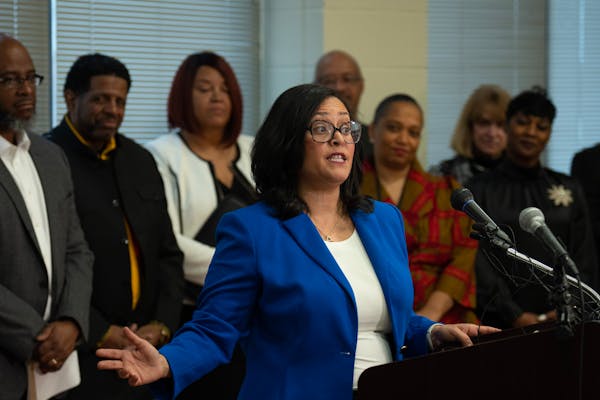Twin Cities Habitat for Humanity and the Minnesota Homeownership Center are launching a new down payment assistance program that aims to narrow racial disparities in the metro housing market by boosting the number of Black homebuyers.
The new program is projected to help more than 200 Black homebuyers starting in 2024. Until then, the two nonprofits hope to raise at least $8 million for the program, which got a head start this month thanks to a $1 million grant from Fannie Mae, the federally sponsored company that guarantees mortgages.
The down payment program is slated to offer five-year forgivable loans of up to 20% of the home purchase price, not to exceed $50,000, to Black descendants of enslaved people.
Officials with Habitat and the Homeownership Center, both based in St. Paul, hope it's a first step toward narrowing Minnesota's persistent racial gaps in homeownership.
"Whatever we've been doing to date, however well intentioned, hasn't been moving the dial," said Julie Gugin, president of the Homeownership Center. "There were reasons why people were kept out of homeownership, and we have to be really intentional about how we're going to address that."
With home costs and interest rates rising, she added, "the need for meaningful amounts of down payment assistance has never been more critical."
Only 12 states have a wider gap in homeownership rates between white residents and communities of color than Minnesota, according to U.S. Census Bureau data. Nearly 78% of white Minnesotans are homeowners, while less than a third of Black residents own a home, according to the 2021 data — making them the least likely of any racial group in Minnesota to own a home.
The new down payment assistance program is part of a broader effort by Twin Cities Habitat to increase Black homeownership. The nonprofit launched a pilot program last fall offering culturally relevant peer-to-peer coaching, flexible underwriting criteria and financial assistance to about 50 Black first-time homeowners.
Habitat, which has long worked with prospective homeowners on education and financing, realized that Black residents in its programs were among the least likely to wind up purchasing a home. Instead of a one-size-fits-all approach, Shereese Turner, chief program officer at Habitat, said the pilot program was designed using feedback from first-time Black homebuyers to better support them.
"This is a very different approach from what we've taken in the past," Turner said.
The $2.5 million annual cost for the pilot program was partly funded by the record $13.5 million grant philanthropist MacKenzie Scott gave Twin Cities Habitat last year.
Some participants in the pilot program may also end up getting the new down payment assistance that Habitat and the Homeownership Center are launching. But most of the recipients getting down payment help will be Black homeowners who aren't part of Habitat's programs.
New federal guidelines allow race to be a factor when lending to an underserved group, permitting the two organizations to start the special purpose credit program — one of the first of its kind in the nation among Habitat affiliates, said Robyn Bipes-Timm, chief strategy officer at Twin Cities Habitat.
Bipes-Timm said she hopes the race-based program is a model for other lending institutions and nonprofits on how to provide targeted support to Black homeowners. Lenders have often used income- or geographic-based factors to reach Black Minnesotans, but she said those proxies haven't been effective in undoing the effects of racial covenants and other discriminatory measures aimed at communities of color.
"We haven't made a dent in closing the homeownership gap," Bipes-Timm said. "We should be as explicit in our solutions being race-based as we were explicit in excluding people from homeownership based off of race."
Twin Cities Habitat was one of five recipients of grants this month in a nationwide competition started by Fannie Mae to fund innovative projects that promote racial equity in housing. The $1 million it received will help launch the special purpose credit program.
The new efforts follow a racial reckoning after the murder of George Floyd at the hands of Minneapolis police in May 2020, drawing more awareness to longstanding racial disparities.
"It's glaringly clear that the discrimination that was brought upon communities of color over the last 100 years has dramatically hindered their ability to succeed in housing," Gugin said. "And I think people are finally paying attention."

Fall or spring, it's Rochester Mayo's year in prep tennis

Minneapolis reaches $150k settlement with eyewitness of George Floyd's murder

Israel-Hamas war creates 'really fraught times' at Minn. colleges

Rare and fatal brain disease in two deer hunters heightens concerns about CWD

